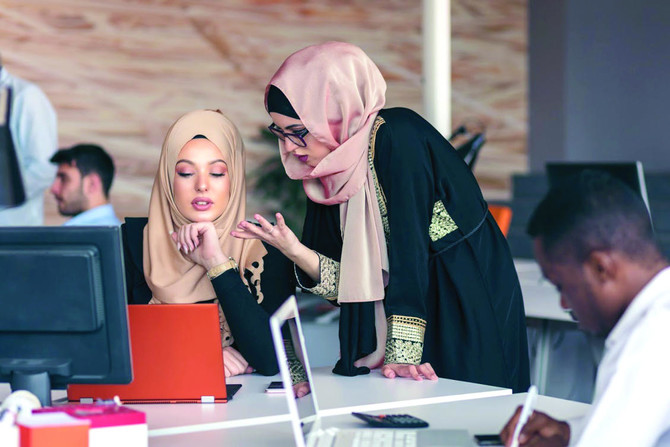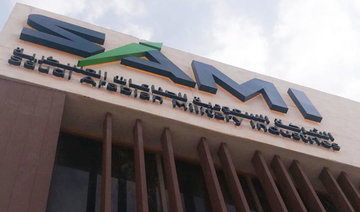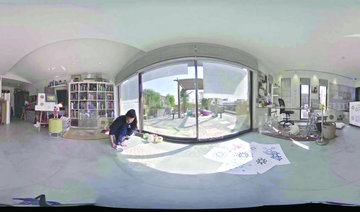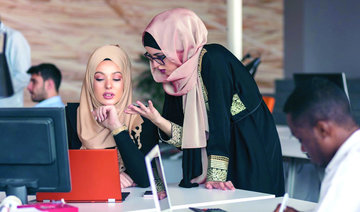NEW HAMPSHIRE: From 4,000 miles away, Saudi students in the US have been watching a political transformation unfold in their homeland with a renewed sense of hope for their own futures — and for the future of a country in a region beset by turmoil.
Since becoming crown prince in June, Mohammed bin Salman has embarked on a series of bold policies designed to curb corruption, push back against religious extremism and confront an expansionist Iran.
Domestically, social reforms have been high on the agenda, including the headline-grabbing decision to allow women to drive. Prohibitions on women driving had consistently been invoked by Saudi Arabia’s overseas friends and critics alike as an unacceptable restriction on civil rights.
“When I came to the US, the first thing I did was get my driving license and get my own car to drive,” said Siham Karkaah, a 33-year-old Saudi student from Riyadh. She arrived in the US in August, and is studying for a master’s degree in education at Southern New Hampshire University (SNHU).
A month after she arrived, the crown prince issued a decree that means she will be able to drive when she returns to Saudi Arabia after completing her studies, something she plans to do.
“I have always been supportive of women’s rights, and I definitely believe in that and women’s freedom, and doing what you want to do as a woman.
“I fully support the changes that have been made. When I do go home, it will be to a different country,” she said.
Karkaah’s enthusiasm was echoed by other young Saudis studying in the US, who believe the crown prince understands their dreams and aspirations far better than previous leaders.
“It’s really important that the crown prince is close to our age; it means he understands our generation. We have a new way of thinking, and he does, too,” said Abdullah Al-Mutairi, 26, another SNHU student from the Kingdom.
He also supported the crown prince’s anti-corruption drive, which included seizing assets from some wealthy members of the Saudi royal family and prominent businessmen.
The crown prince’s methods have provoked concern in the US about respect for property rights and due process, although there is a widespread belief among US experts and Saudi expats that serious action against financial corruption was needed.
“I wasn’t expecting the crown prince to do what he did, but I’m glad he chose to,” Al-Mutairi, a business studies student, said.
Although supportive of the decision to let Saudi women drive, Al-Mutairi said the measure would run up against a strong strand of conservatism in Saudi society.
“Women may now be legally allowed to drive, but if there are men in their family who don’t want them to, that is a real barrier. The women could go to court, and they could win, but it might mean breaking ties with their family, which would be a huge sacrifice,” he said.
Saudi students typically come to the US to benefit from a learning environment they say is more open, supportive and of higher quality than they are able to get at home. Fees are usually paid by a Saudi government-funded scholarship fund, which also covers living costs.
SNHU, in the New Hampshire city of Manchester, is considered one of the most innovative higher education establishments in the US and has long been popular with Saudi students.
Another SNHU student, Hussam Samir Al-Deen, said he had longed to visit the US and had learned a great deal from his time there. He hopes to find work in the US after graduating, but expects to return home one day.
The 28-year-old from Jeddah said he tried to be a good ambassador for his nation. “Most Americans I’ve met have been very nice, but some have the wrong impression about Saudi Arabia and about Islam. I hope I have helped to improve their view,” he said.
Al-Deen said he and friends had suffered isolated cases of racism, or had been called terrorists by people in the street.
“I just ignore them, they don’t really understand what they are saying — most people are very kind,” he said.
His years studying in the US had changed him and some of his views on culture, he said. If there was one social reform that could be added to the list of those underway in Saudi, he hoped it would be a shift in the nature of personal relationships.
“In Saudi Arabia, it is more difficult to be friends with women, or to work alongside women, and it is not always accepted that you get to marry the woman you love. Instead you are supposed to marry and hope you fall in love with your wife afterwards. I would like to see those things change one day,” he said.
Saudi students abroad are watching in hope as dramatic reforms in the Kingdom promise a new era of optimism
https://arab.news/rpc6n
Saudi students abroad are watching in hope as dramatic reforms in the Kingdom promise a new era of optimism

Saudi leadership extends condolences after Iraq shopping mall fire kills more than 60

- A fire tore through a shopping mall in the Iraqi city of Kut on Wednesday night, killing at least 61 people
RIYADH: Saudi Arabia’s King Salman and Crown Prince Mohammed bin Salman extended their condolences on Thursday to Iraqi President Abdul Latif Rashid after a fire tore through a shopping mall in the Iraqi city of Kut overnight, killing at least 61 people.
Officials said many people suffocated in the bathrooms of the newly opened shopping mall. A civil defense spokesperson told state media that the fire erupted in the perfume and cosmetics section on the second floor.
Most victims were on the upper floors, while many on the ground floor managed to escape, he said.
The king and crown prince prayed that God forgive the deceased and wished the injured a speedy recovery.
Saudi youth engineer their way to STEM Racing triumph

DHAHRAN: Cheers and confetti filled the stage at Ithra’s theater in Dhahran on Wednesday night as four teams of Saudi students were crowned national champions in the 2025 STEM Racing competition.
All four teams earned the honor of representing the Kingdom at the Aramco STEM Racing World Finals 2025, supported by Formula 1, in Singapore from Sept. 27 to Oct. 2.
The fourth edition of STEM Racing Saudi Arabia, held under the umbrella of the King Abdulaziz Center for World Culture (Ithra), brought together finalists from six cities: Riyadh, Jeddah, Dhahran, Dammam, Al-Ahsa, and Abha.
From regional qualifiers to wind tunnel testing, digital simulations, enterprise planning, and brand building, students spent months building mini Formula 1-style race cars and pitching their ideas in front of judges and mentors.
First place nationally was claimed by Team Rimah from Dhahran, a returning competitor who missed out on a qualifying spot the previous year. Second place went to Giddam from Riyadh, followed by Sadeem from Dhahran in third, and YLA Accelerate from Jeddah in fourth.
Team Rimah member Fares Al-Garaawi said the team’s experience has been all about growth. “This wasn’t my first year. I competed last year, too, but we didn’t qualify. I took that lesson and came back stronger,” he said.

Fajer Al-Ameer from Giddam, who also won the Best Pit Display award, said the competition helped her to rebuild after setbacks.
“Last year, I didn’t win. But I came back with a clear goal. I wanted to win — not just make memories or enjoy the events. And this time, I did both,” she said.
More than 1,000 students took part in this year’s edition, with finalists selected through a series of rigorous regional qualifiers. The program blends engineering and enterprise with creative branding, public speaking, digital marketing, and sustainability.
Alongside the four winners, 14 special awards were made to recognize outstanding achievements in areas such as speed, design, sustainability, branding, and communication.
Using advanced tools such as CAD modeling, 3D printing, and wind tunnel simulations, each team was tasked with building a high-performance miniature race car powered by compressed carbon dioxide, and refined for aerodynamics, branding, and data precision.
Held under the theme “Engineering the Future,” the final ceremony celebrated not only winners, but also resilience, creativity, and collaboration. Students shared stories of failure turned into learning, and learning turned into leadership.

The top four teams will now represent Saudi Arabia in Singapore at the F1 in Schools World Finals, where students from over 30 countries will compete. Past Saudi teams have gained global attention, and expectations are high for this year’s delegation.
The initiative is part of Ithra’s broader mission to empower young Saudis through experiential learning that aligns with Vision 2030. By combining technical training with soft skills and national representation, STEM Racing is turning passion into purpose.
As the lights dimmed on the ceremony, students stood smiling with their medals, trophies, and mentors. The cars may be small, but their dreams are running full speed ahead.
Saudi surgeons successfully separate conjoined 7-month-old twins in 15-hour operation

- Twins Yara and Lara were joined at the lower abdomen and pelvis, had separate upper and lower limbs but shared some internal organs
- ‘The joy after the separation of the twins is indescribable; it’s a completely different kind of happiness,” says their father Muaid Al-Shehri
- This surgery is the 65th operation of its kind in the 35-year history of the Saudi Conjoined Twins Program
RIYADH: Surgeons in Saudi Arabia successfully separated 7-month-old conjoined twins during a 15-hour operation at King Abdullah Specialist Children’s Hospital in Riyadh on Thursday.
Muaid Al-Shehri, the father of the twins, Yara and Lara, described the operation as a profound and emotional moment for his family.
“The support has been great,” he said. “Honestly, the joy after the separation of the twins is indescribable; it’s a completely different kind of happiness.
“There was absolutely no hesitation when we were told the twins could be separated — it was pure joy. It was truly something extraordinary. We thank God and are deeply grateful for our great nation.”
The twins were joined at the lower abdomen and pelvis. They had separate upper and lower limbs but shared some organs in the lower abdomen and pelvis.
Speaking to Arab News before the operation was completed, Abdullah Al-Rabeeah, an adviser to the Royal Court and general supervisor of Saudi aid agency KSrelief, said that one of the main difficulties surgeons faced was working in a small space where several critical anatomical features overlapped.
“The big challenge here is that we are working in a narrow space where many structures join,: he said. “We’re talking about a joint rectum, joint parts of the urinary bladder.
“This case is complex. It involves many doctors, specialists and technicians. We are expecting 38 members to participate in this surgery, from consultants, specialists (to) technicians, nurses.
“It is a delicate surgery. We expect to lose some blood but I am confident in my colleagues and their experience. We have done similar cases in the past with success, and I’m sure that (God willing) this case will be another achievement for the Kingdom of Saudi Arabia.”
The surgery was the 65th operation of its kind in the 35-year history of the Saudi Conjoined Twins Program. Al-Rabeeah said that the work of the program continues far beyond surgery.
“The case does not end with the separation,” he explained. “First of all, immediately after separation they will need a lot of extensive care in the pediatric intensive care unit to ensure that they recover very well.
“When they recover from surgery, they will be subjected to an intensive rehabilitation and physiotherapy program so that they will be able to be active and will be able to sit and stand outdoors.”
Cases such as this one reflect the broader transformation of the Kingdom’s healthcare sector in line with the goals of the Saudi Vision 2030 plan for national development and diversification, Al-Rabeeah said.
“This is one of the most complex surgeries that are done worldwide, and Saudi Arabia is leading the world,” he added.
“So this is actually a reflection of the (Vision 2030) that the healthcare of Saudi Arabia will not only be of a high standard but also filled with capable young boys and girls from Saudi Arabia.”
Dorrah Alsaadoon, a social worker assisting the family at the hospital, told Arab News that the provision of support is essential to help prepare relatives for the separation surgery.
“Psychological and social support helps the family cope with fear and anxiety, strengthens their ability to adapt, and gives them the emotional strength to face the challenges of surgery and beyond with resilience and hope,” she said.
“My role, as a social worker responsible for conjoined twins, is to provide emotional and psychological support to the family, prepare them mentally for the surgery, help them understand the medical process, and ease their anxiety before and during the operation.”
She also highlighted the fact that the care provided to the family will continue long after the operation.
“Post-surgery support systems include psychological and social support, sessions to help parents emotionally prepare for reconnecting with their children after the changes, and guidance to help them adjust to the new demands of daily life,” Alsaadoon said.
She added that the twins themselves will also require physical and psychological support.
“After surgery, the twins need physical rehabilitation to strengthen their muscles and learn independent movement, and psychological support to help them adjust to their new bodies, build a sense of identity and develop independence.”
How quantum computing and AI can accelerate and improve drug development

- Quantum computing could revolutionize drug development by simulating complex molecules far faster than traditional methods
- Saudi Arabia is entering the quantum race, with Aramco and France’s PASQAL deploying the Kingdom’s first quantum computer
RIYADH: Using traditional discovery processes, a staggering 90 percent of drug development trials are unsuccessful. But what if there is a future in which quantum technologies could revolutionize that process to achieve unprecedented efficiency?
The race to develop quantum computers has been surging worldwide. In April, IBM announced a $150 billion investment plan to strengthen US technologies and innovation over the next five years, including a push for quantum computer development.
Additionally, the UK’s National Quantum Technologies Programme has invested more than £1 billion in quantum technology since its establishment in 2014, with facilities such as the National Quantum Computing Centre.
PASQAL in France is also a leading company in quantum research. In 2024, Saudi Aramco signed an agreement with PASQAL to deploy the first quantum computer in the Kingdom, scheduled to be up and running by the end of this year.
If the promise of quantum computing holds, the pharmaceutical industry could be looking at faster, more accurate, and less costly drug discovery and development.
The World Health Organization predicts that antimicrobial resistance to existing drugs will lead to 10 million human deaths by 2050. To stop the timer, the pharmaceutical industry must adopt new and innovative technologies.
Artificial intelligence has already had a huge impact on the efficiency and success of clinical trials, generating new materials and computationally predicting their performance rather than relying on scientists’ intuition for molecular hypotheses that then must be synthesized and tested repeatedly.

Quantum computing, however, has the potential to take it one step further. It uses special units called qubits (quantum bits), which can exist in multiple states at once and can link together in unique ways, to perform computations much more efficiently than classical computers.
In layman’s terms, quantum computers solve complicated problems quicker while AI simplifies the problem and then solves it. Quantum computers understand the problem. AI does not.
A research scientist focusing on computational catalysis with a doctoral degree in chemical engineering spoke to Arab News about the current feasibility of this tool.
“We are talking about mature technology (AI) versus very immature technology (quantum),” he said.
According to the World Economic Forum, in synergy, quantum computing and AI can lead to enhanced molecular understanding.
Although our expert heeds that “we are not at the stage where we can actually do that, we can only do it on very specific problems because there are many physical limitations… you need to be able to manipulate atoms in a very precise way that we currently cannot do.”
Quantum physics allows scientists to predict the behavior of electrons in molecules, producing detailed three-dimensional structural insight into new drug designs.
Rather than adopting traditional laborious methods such as X-ray crystallography, quantum principles and AI provide virtual simulations.
AI further accelerates this process by quickly analyzing datasets and clinical outcomes to pin down favorable drug targets and predict a compound’s efficacy.
A novel tool called quantum machine learning combines AI’s power of data analysis and pattern recognition with quantum computing’s ability to simulate complex molecular behavior throughout trillions of possibilities.
This paves the way to more accurate and faster predictions in drug binding orientation, absorption, and metabolic pathways.

QML makes it possible to sift through vast chemical spaces holding trillions of potential drug candidates in weeks or days in contrast to the years that classical computers would need.
With the integration of quantum computing and AI, compound screening traditionally executed “in vitro,” meaning outside of a living organism, can be done “in silico” instead, meaning carried out in virtual simulations.
A new quantum-AI model developed by Qubit Pharmaceuticals with Sorbonne University and announced in May of this year called FeNNix-Bio1, reportedly leverages unprecedented computational power and very accurate molecular databases.
Employing the principles of quantum mechanics (such as superposition and entanglement), quantum computers can model molecular and atomic behavior with great accuracy and speed.
This is critical to understanding relevant properties such as molecular stability, binding affinity, and how drugs could interact with target proteins in real-world conditions.
Structural optimization and docking — determining how a drug candidate fits into a biological target, can be simplified using QML and quantum-powered algorithms.
These algorithms rapidly evaluate orientations of molecules against target structures to identify optimal configurations, and which molecules will bind most effectively. This enhances drug absorption and metabolic stability.
Quantum computing and AI models are then able to streamline the preclinical phase, delivering only the most promising compounds to laboratory validation, significantly reducing tedious lab work and enabling researchers to conduct faster and cheaper work.
And with more accurate early-stage predictions, overall success of clinical trials is boosted, lab to market time is reduced, and the possibility of delivering targeted treatments for unmet patient needs is increased.
“You do patient trials to reduce the risk of anything going wrong with the patient, imagine if you are able to accurately predict how the drug will affect people without doing a trial. This will create a leap in how we produce drugs and how we can commercialize drugs,” our expert said.
Meeting specific patient needs based on their biological profiles rather than producing drugs for a wide demographic can drastically change our healthcare systems and how we consume products.
Patients will be able to get a drug for diseases such as Alzheimer’s, diabetes, cancer, and more without having to wait ten years for a trial to decide their fate.
You can also anticipate what conditions or illnesses people are at high risk of developing later in life and treat them early on, such as joint pain and hair loss.
It comes down to significant time reduction and improved chances of success.
“A quantum computer can significantly increase my accuracy. My chances of success are very dependent on my prediction of the performance.
“The quantum computer can make more accurate calculations that can make my predictions of the performance much more accurate. By doing that, my chances of success will be higher.
“Another way is that a quantum computer will be much faster in performing tasks, generating structures and predicting their performance than AI, and by that I will reduce my time further.”
Although we are still a long way from achieving this, the functionality of quantum computing and AI theorizes that personalized medicine and treatments for patients is possible.

“If (specific patient information) becomes accessible to those companies… then they match that information to their database, hypothetically speaking it is possible.”
Although this all sounds like the realms of sci-fi, there have been significant strides in this area of quantum research.
Pfizer and its partner XtalPi, a US-China pharmaceutical tech company, reportedly used quantum-inspired algorithms and AI cloud computing to reduce 3D structure prediction time of new molecules from months to days, enabling rapid assessment of candidate molecules and their drug-likeness.
Additionally, it is said that Qubit Pharmaceuticals’ FeNNix-Bio1 quantum AI model could be used for QML applications such predicting toxicity, side effects, and drug metabolism with greater speed and accuracy.
Taking it into perspective, our expert said: “Three years ago, no one would have thought we would have a large language model that can perform as well as ChatGPT does today, it came out of left field. A breakthrough could happen.”
However, WEF warns that before this technology can become the new commercial norm, certain guardrails need to be put in place to ensure the safe, effective, and responsible use of this novel tool.
Data integrity and avoiding bias, ethical and regulatory oversight, workforce readiness training, and a shared vision for applying best practices all must be upheld industry wide.

Saudi deputy FM meets chair of Italian Senate’s foreign affairs committee

ROME: Saudi Deputy Minister of Foreign Affairs Waleed bin Abdulkarim Elkhereiji met on Thursday with Sen. Stefania Craxi, chair of the Italian Senate’s foreign affairs and defense committee, in Rome.
During the meeting, they discussed means of cooperation between the two countries and discussed regional and international issues of mutual interest.




















